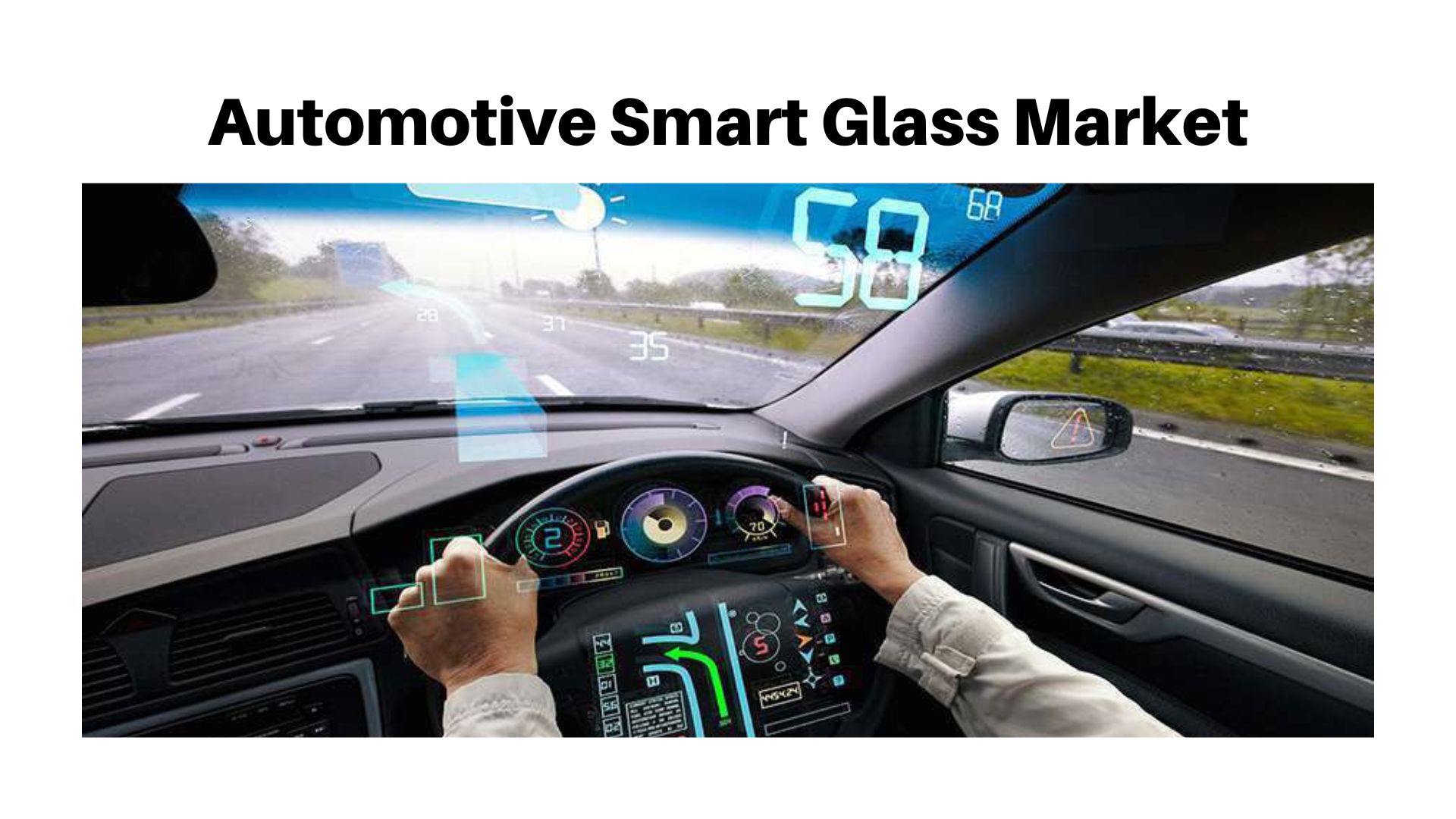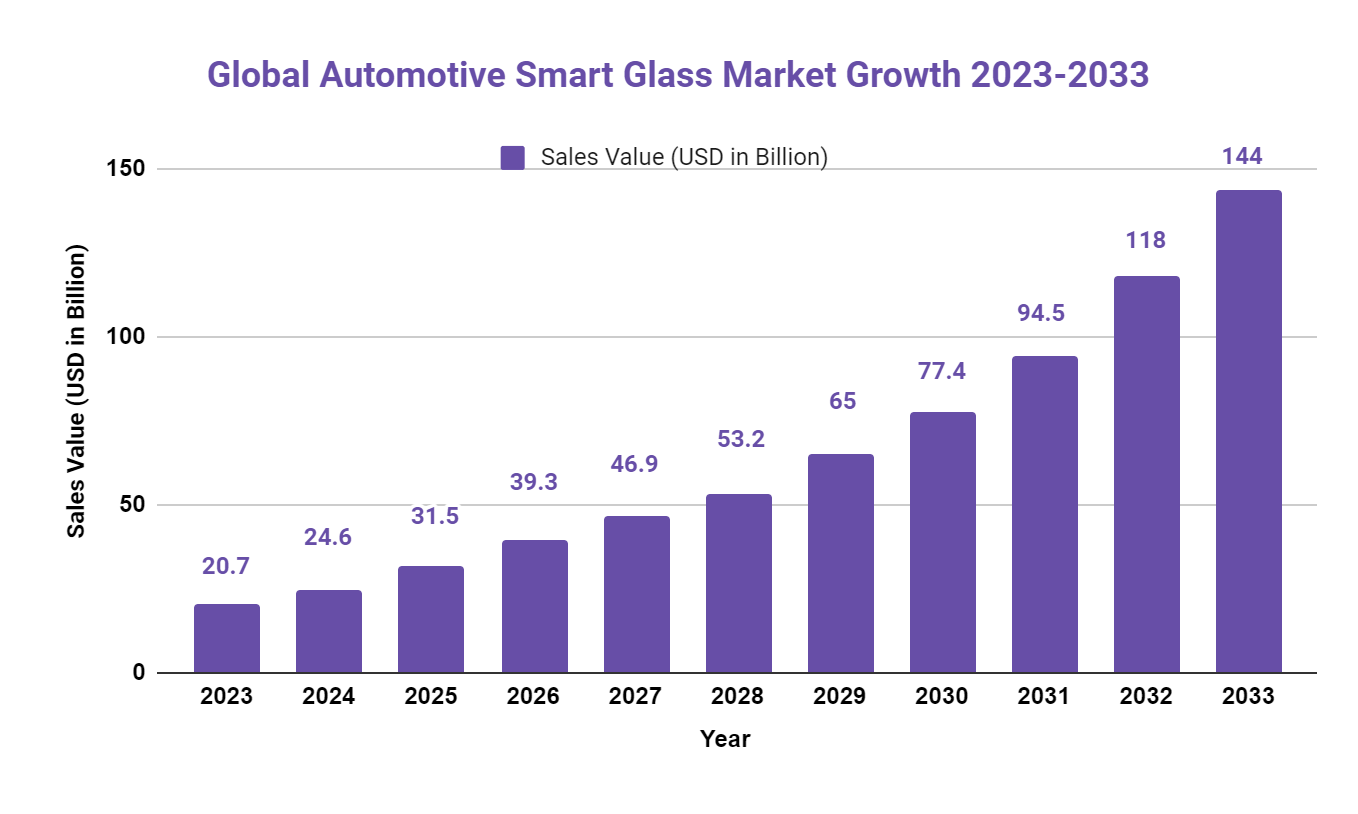Automotive Smart Glass Market Anticipated To Reach USD 144 Billion by 2033

Page Contents
Published Via 11Press: The automotive smart glass market was valued at USD 16.9 Billion in 2022, with expectations to increase rapidly to reach an anticipated value of approximately USD 144 Billion by 2033 – representing a compound annual growth rate of 22.03% during this time frame (2023-2033).
Automotive smart glass refers to transparent materials capable of changing their light transmittance properties when exposed to external stimuli such as temperature variations, light intensity variations, or voltage adjustments. Automotive glass has gained in popularity over time as it improves energy efficiency while offering passengers comfort and safety, plus privacy protection – it may even enhance privacy protection!
The automotive smart glass market is forecasted to experience rapid expansion over the coming years as technological innovations make manufacturing cheaper and simpler, alongside the rising popularity of electric vehicles and an emphasis on energy efficiency, creating opportunities for this innovative glass material. Automotive smart glass may play an essential part in shaping its industry in the years ahead.
Request For Sample Report Here: https://market.us/report/automotive-smart-glass-market/request-sample/
Key Takeaways
- Automotive smart glass refers to any form of transparent material which has the capacity to change its light transmission properties in response to external stimuli, like soundwaves.
- Automotive smart glass markets are driven by factors including an increasing need for energy-saving solutions, the surge in popularity of electric vehicles, and technological innovation in smart glass production, along with growing passenger comfort and safety concerns.
- Automotive smart glass has multiple applications in a vehicle's interior such as sunroofs, windows, windshields, and mirrors.
- The automotive smart glass market is poised for rapid expansion due to increasing consumer demands for energy-saving and eco-friendly automotive solutions.
- Automotive smart glass adoption is expected to increase as new technologies make production cheaper and simpler.
- Automotive smart glass offers several significant benefits that could transform the future of the auto industry: reduced energy usage, greater passenger comfort, and safety, and privacy protection – making it a crucial technology.

Driving Factors
- Demand for energy-efficient solutions: Automotive smart glass has long been used to help lower energy usage by blocking heat and decreasing air conditioning requirements, so its popularity among drivers as a fuel saver and emissions reducer is unsurmountable.
- Smart Glass as an Energy-Efficient Component for Electric Vehicles: With the rise in popularity of electric vehicles comes to an increasing need for lightweight yet energy-efficient components – smart glass being one such component that helps lower both weight and increase energy efficiency in these vehicles.
- Technological Advancements in Smart Glass: With new materials and technologies making smart glass production cheaper and simpler, more applications have arisen for it in automotive production resulting in higher demand for smart glass in that field.
- Focus on passenger comfort and safety: Automotive smart glass helps improve passenger comfort and safety by reducing glare, blocking UV rays, and providing privacy – something many consumers take note of which has led to greater interest in smart glass in vehicles.
Restraining Factors
- Production: Producing automotive smart glass still incurs relatively higher production costs compared to regular glass, potentially hindering its spread through the market.
- Availability: Smart glass has yet to become widely available across automotive industries, which could potentially reduce its adoption by consumers in the market.
- Reliability issues: Concerns have been expressed over the reliability of automotive smart glass technology under extreme temperatures or harsh climate conditions, potentially hindering its acceptance on the market.
- Lack of Awareness: Unfortunately, consumers and businesses alike might be unaware of the many advantages provided by the automotive smart glass, thus hindering its adoption in the market.
- Restrictive Barriers: Regulations and standards surrounding automotive smart glass remain under development, which could hamper its adoption into the market.
Challenges
- High Initial Costs: At present, smart glass technology implementation in vehicles may present high initial costs that might make it less attractive to budget-minded buyers.
- Technological Limits: Smart glass technology is still relatively new and not as advanced as other technologies; for instance, smart glass could take longer to respond to changes in lighting or temperature fluctuations which would limit its effectiveness.
- Materials Scarcity: Unfortunately, smart glass production still relies heavily on materials with limited supply; this could impede its market expansion.
- Reliability issues: Concerns have been expressed over the reliability of smart glass technology in extreme weather conditions or during power failure events, specifically under extreme temperatures or power cuts.
- Resistance to change: Consumers and businesses may resist change and may prefer traditional glass products over smart glasses due to familiarity and ease of use.
Key Market Segments
Market by Type
- Electrochromoics
- Polymer-Dispersed Liquid Crystal (PDLC)
- Suspended Particle Device (SPD)
- Others
Market by Application
- Passenger Cars
- Commercial Vehicles
Key Market Players
- Saint-Gobain
- NSG Group
- Fuyao Glass Industry Group
- Asahi Glass
- Central Glass
- Corning
- DowDuPont
- Pittsburgh Glass Works (PGW)
- Soliver
- Xinyi Glass Holdings
- BSG
- Taiwan Glass
- Safelite
- American Glass Products
- Research Frontiers
- Lihua Glass
- Changjiang Glass
- Guanghua Glass
Regional Snapshot
- North America: North America is one of the largest markets for automotive smart glass, driven by the presence of major automotive manufacturers and growing demand for energy-efficient solutions.
- Europe: Europe is also a significant market for automotive smart glass, with a high demand for luxury vehicles and a focus on sustainability in the automotive industry.
- Asia Pacific: The Asia Pacific region is expected to see the highest growth in the automotive smart glass market, driven by increasing demand for electric vehicles and a growing middle class in countries like China and India.
- Middle East and Africa: The Middle East and Africa region is a relatively small market for automotive smart glass, but there is potential for growth as the automotive industry in the region continues to develop.
- Latin America: Latin America is also a small market for automotive smart glass, but there is increasing demand for energy-efficient solutions and a growing automotive industry in countries like Brazil and Mexico.
Get this Research Report as Per Customization @ https://market.us/report/automotive-smart-glass-market/#inquiry
Recent Developments
- Technological Advances: Manufacturers have made remarkable strides forward with smart glass technology, such as quicker response times and increased energy efficiency.
- Growing demand for electric vehicles: With their rising popularity comes increasing demand for energy-efficient solutions such as smart glass technology.
- Integration with other smart technologies: Smart glass technology is being integrated with other intelligent technologies such as sensors, cameras, and displays to offer a more seamless user experience.
- Manufacturers are increasing the production capacity of smart glass, which helps lower costs and improve availability.
- Adoption by major automotive manufacturers: BMW, Mercedes-Benz, and Tesla have begun adopting smart glass technology into their vehicles, spurring greater market uptake of this form of innovation.
- Focus on sustainability: With increasing attention being paid to sustainability within the automotive industry, smart glass technology is increasingly seen as an effective means for reducing energy usage and improving environmental impacts.
Report Scope
| Report Attribute | Details |
| The market size value in 2022 | USD 16.9 Bn |
| Revenue Forecast by 2032 | USD 144 Bn |
| Growth Rate | CAGR Of 22.03% |
| Regions Covered | North America, Europe, Asia Pacific, Latin America, and Middle East & Africa, and the Rest of the World |
| Historical Years | 2017-2022 |
| Base Year | 2022 |
| Estimated Year | 2023 |
| Short-Term Projection Year | 2028 |
| Long-Term Projected Year | 2032 |
Frequently Asked Questions:
Q. What is Automotive Smart Glass?
A. Automotive smart glass refers to any form of transparent or opaque material that responds to an electric signal to change its transparency or color, commonly used in car windows and sunroofs.
Q. How Does Automotive Smart Glass Work?
A. Automotive smart glass uses an electrochromic material between two layers of glass. When an electrical current is applied, this layer alters its opacity allowing clear or tinted tint to change quickly when an electrical current passes through it, giving you complete control over what glass tint you see through your windows.
Q. What are the Benefits of Automotive Smart Glass?
A. Automotive smart glass provides many advantages, such as increased energy efficiency, greater privacy protection, and enhanced aesthetics.
Contact Person: Mr. Lawrence John
Market.us (Powered By Prudour Pvt. Ltd.)
Tel: +1 718 618 4351
Send Email: [email protected]
The team behind market.us, marketresearch.biz, market.biz and more. Our purpose is to keep our customers ahead of the game with regard to the markets. They may fluctuate up or down, but we will help you to stay ahead of the curve in these market fluctuations. Our consistent growth and ability to deliver in-depth analyses and market insight has engaged genuine market players. They have faith in us to offer the data and information they require to make balanced and decisive marketing decisions.



